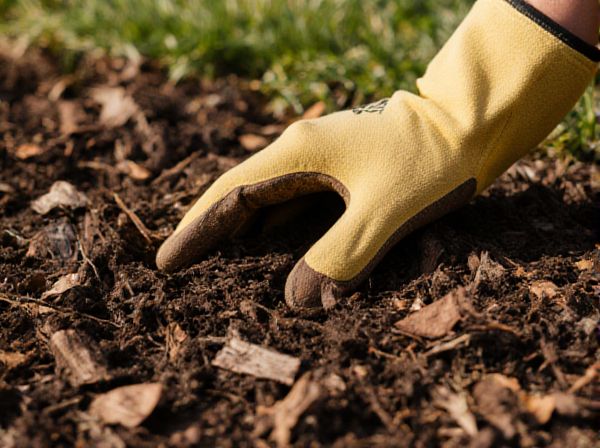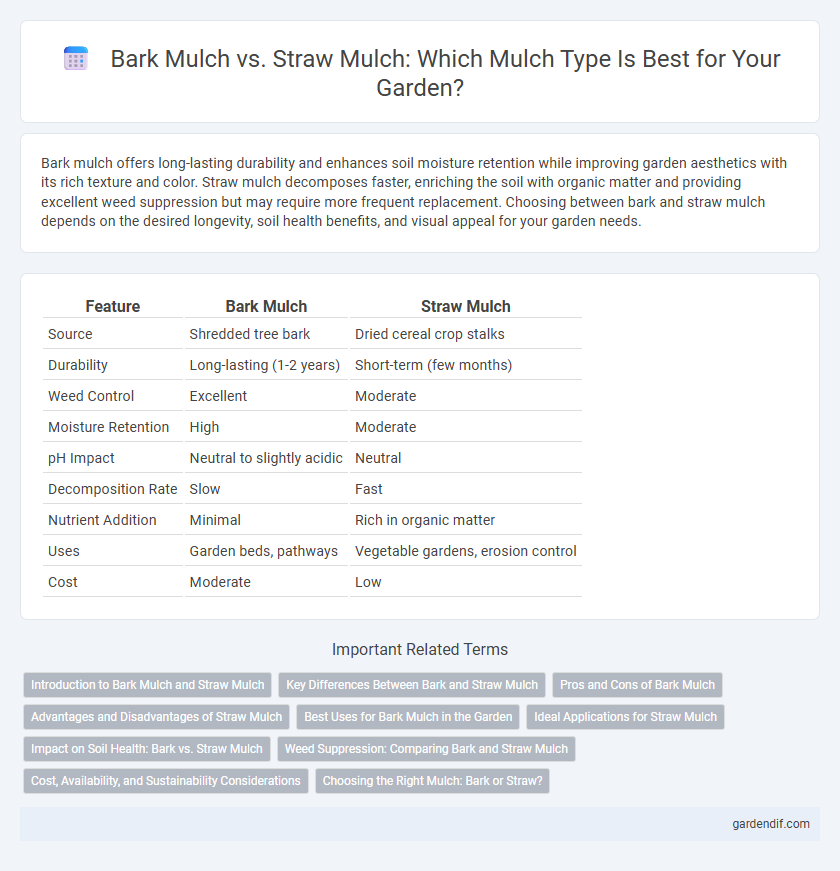
Bark mulch vs straw mulch Illustration
Bark mulch offers long-lasting durability and enhances soil moisture retention while improving garden aesthetics with its rich texture and color. Straw mulch decomposes faster, enriching the soil with organic matter and providing excellent weed suppression but may require more frequent replacement. Choosing between bark and straw mulch depends on the desired longevity, soil health benefits, and visual appeal for your garden needs.
Table of Comparison
| Feature | Bark Mulch | Straw Mulch |
|---|---|---|
| Source | Shredded tree bark | Dried cereal crop stalks |
| Durability | Long-lasting (1-2 years) | Short-term (few months) |
| Weed Control | Excellent | Moderate |
| Moisture Retention | High | Moderate |
| pH Impact | Neutral to slightly acidic | Neutral |
| Decomposition Rate | Slow | Fast |
| Nutrient Addition | Minimal | Rich in organic matter |
| Uses | Garden beds, pathways | Vegetable gardens, erosion control |
| Cost | Moderate | Low |
Introduction to Bark Mulch and Straw Mulch
Bark mulch, derived from tree bark, offers long-lasting soil protection and enhances moisture retention, making it ideal for garden beds and landscaping. Straw mulch, composed of dried stalks such as wheat or barley, decomposes faster and enriches soil with organic matter, benefiting vegetable gardens and annual plants. Both mulches regulate soil temperature and suppress weeds, but selection depends on specific gardening needs and plant types.
Key Differences Between Bark and Straw Mulch
Bark mulch, derived from tree bark, offers long-lasting durability and slower decomposition, providing extended weed suppression and soil moisture retention compared to straw mulch. Straw mulch, made from cereal crop stalks, decomposes more rapidly, enhancing soil organic matter but requiring more frequent replacement. The choice between bark and straw mulch impacts soil temperature regulation, nutrient cycling, and garden aesthetics, influencing plant health and maintenance needs.
Pros and Cons of Bark Mulch
Bark mulch offers long-lasting weed suppression and excellent moisture retention, making it ideal for garden beds and trees due to its slow decomposition rate. Its dense texture improves soil structure and provides a natural aesthetic but can sometimes acidify soil, which may not suit all plants. Bark mulch is more durable and less likely to blow away compared to straw mulch but tends to be more expensive and heavier to apply.
Advantages and Disadvantages of Straw Mulch
Straw mulch improves soil moisture retention and temperature regulation while adding organic matter that decomposes quickly, enriching the soil with nutrients. It is lightweight and easy to spread but can blow away easily in windy conditions and may introduce weed seeds or pests. Straw mulch decomposes faster than bark mulch, requiring more frequent replenishment to maintain its benefits.
Best Uses for Bark Mulch in the Garden
Bark mulch is ideal for garden beds, trees, and shrubs due to its slow decomposition rate, which provides long-lasting weed suppression and moisture retention. Its coarse texture improves soil aeration and drainage while enriching the soil with organic matter as it breaks down. Using bark mulch around acid-loving plants like azaleas and rhododendrons enhances soil acidity and overall plant health.
Ideal Applications for Straw Mulch
Straw mulch is ideal for vegetable gardens and newly seeded lawns due to its excellent moisture retention and temperature regulation properties. It decomposes quickly, enriching the soil with organic matter, making it beneficial for annual plants with shorter growth cycles. Straw mulch is also favored in erosion control on slopes and in areas prone to heavy rainfall, as it provides effective ground cover without compacting the soil.
Impact on Soil Health: Bark vs. Straw Mulch
Bark mulch improves soil health by slowly decomposing and enriching the soil with organic matter, enhancing moisture retention and microbial activity. Straw mulch provides quicker nutrient release but decomposes faster, potentially leading to nitrogen depletion if not managed properly. Both mulches protect soil structure and reduce erosion, but bark mulch offers longer-lasting benefits for soil microbial ecosystems.
Weed Suppression: Comparing Bark and Straw Mulch
Bark mulch provides superior weed suppression due to its dense and long-lasting coverage, creating an effective barrier that inhibits weed seed germination. Straw mulch, while lighter and easier to apply, tends to break down faster and may allow more sunlight and air to penetrate, reducing its effectiveness in weed control. Choosing bark mulch enhances garden maintenance by minimizing weed growth and preserving soil moisture over extended periods.
Cost, Availability, and Sustainability Considerations
Bark mulch generally costs more than straw mulch but offers greater durability, reducing the frequency of replacement. Bark mulch is widely available in garden centers and sourced from forestry byproducts, enhancing its sustainability profile, while straw mulch, often made from agricultural residues, is less expensive and biodegradable but may need more frequent replenishment. Considering sustainability, bark mulch supports waste reduction from timber industries, whereas straw mulch promotes recycling of crop remains, each with specific environmental benefits.
Choosing the Right Mulch: Bark or Straw?
Bark mulch offers long-lasting weed control and moisture retention, making it ideal for perennial gardens and trees, while straw mulch decomposes quickly and enriches soil with organic matter, suitable for vegetable beds and annual plants. Bark mulch provides a more uniform appearance and better erosion resistance, whereas straw mulch is lightweight and easier to apply in large areas. Selecting the right mulch depends on your garden's plant types, desired maintenance level, and soil improvement goals.
Bark mulch vs straw mulch Infographic

 gardendif.com
gardendif.com